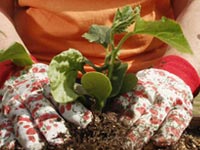 Money Saving Tips on Gardening
Money Saving Tips on Gardening
Source: http://www.aarp.org/money/budgeting-saving/info-06-2013/8-moneysaving-garden-tips.html
1. Bugs be gone
Forget expensive bug zappers and pesticides. Hang a fabric softener sheet adjacent to — but not touching — outdoor light fixtures to keep flying insects like mosquitoes and moths away. They hate the scents generated when the softener sheets are heated.
2. Keep deer away
Pouring or spraying a “rotten egg” cocktail around your plants will keep deer from eating them. Just mix six raw eggs in two gallons of water and let it sit outside for a week. The smell will keep Bambi at bay.
3. Mow it yourself
Use a manual lawn mower instead of a power mower or hiring someone to do the work. It will save you money and give you some exercise.
4. Mooch off mulch
Looking for free garden mulch? Ask road crews clearing trees and brush if they’ll dump their payload of wood chips at your place. They may be willing to off-load them rather than having to haul them away at the end of a job. Also check with your local government, which may shred discarded wood and wood products and give away the resulting mulch.
5. Cover up weeds
Save money on weed killers by spreading several layers of newspaper on the soil before mulching over them in the garden. This blocks weeds from growing and it helps retain moisture, so you save even more by needing to water plants less.
6. Bye-bye weeds (Part 2)
Avoid expensive and toxic weed killers by dousing weeds with scalding water left over after boiling potatoes or pasta.
7. Bye-bye weeds (Part 3)
Most weeds can also be killed with an inexpensive and eco-friendly spray made from 1 gallon of white distilled vinegar mixed with 1 ounce of liquid dish soap.
8. Fall planting
Most people get the urge to plant new flowers, trees and shrubs in the spring, but in most climates the best time to plant them is in the late summer or fall, when their chances of survival are better and when they’re often marked down at nurseries.
Irrigate Lawn and Garden with a Rain Barrel
Cost Savings: $100-$300
The average U.S. household spends more than $500 on its water and sewer bill annually, and it’s been estimated that homeowners use 20%-60% of their water to irrigate lawn and garden. The percentage is on the lower end in regions like the water-rich Northeast, and on the higher end in regions like the perennial dry Southwest.
A rain barrel may cost about $50 to build, or as little as $119 to buy. (That’s what the 48-gallon Smartware rain barrel pictured here costs at amazon.com.) If you irrigate with the rain water it collects after running off the roof, though, it will pay for itself in no time, and save you money on water bills thereafter. Also remember to do your watering in the early morning, so that the water seeps in and doesn’t just evaporate.
Compost
Cost Savings: $30-$60
If you’re obsessive about how green your grass grows, or if you love to grow vegetables or flowers in the garden, then you can save significant money on fertilizer by making your own… from kitchen scraps and lawn waste.
Compost is nature’s gift to gardeners. Just set aside a small patch of land for a pile, or buy a composter to speed the process, and soon you will have created rich, nutrient-rich earth from your vegetable trimmings, coffee grinds, brown leaves, grass clippings and other “waste.”
The average U.S. lawn is about 8,000 square feet, and fertilizer makers recommend spreading about a pound of nitrogen per 1,000 square feet; at roughly $2 a pound and two applications a year, you can easily spend $30 a year on lawn fertilizer alone.
When the compost is ready to use, usually after a few weeks or months after starting the process, you can either mix it into garden soil, or make compost tea, a simple slurry of compost and water that you can spread on the lawn or garden in place of fertilizer. Bonus: By improving the soil with beneficial nutrients and bacteria, and not just scorching it with extra nitrogen, you’ll improve its health and make it more resistant to infestations by pests or decimation by drought.
Another bonus: If you pay for trash disposal by the bag, you’ll also cut down on waste disposal costs by diverting all those food scraps into the garden.
